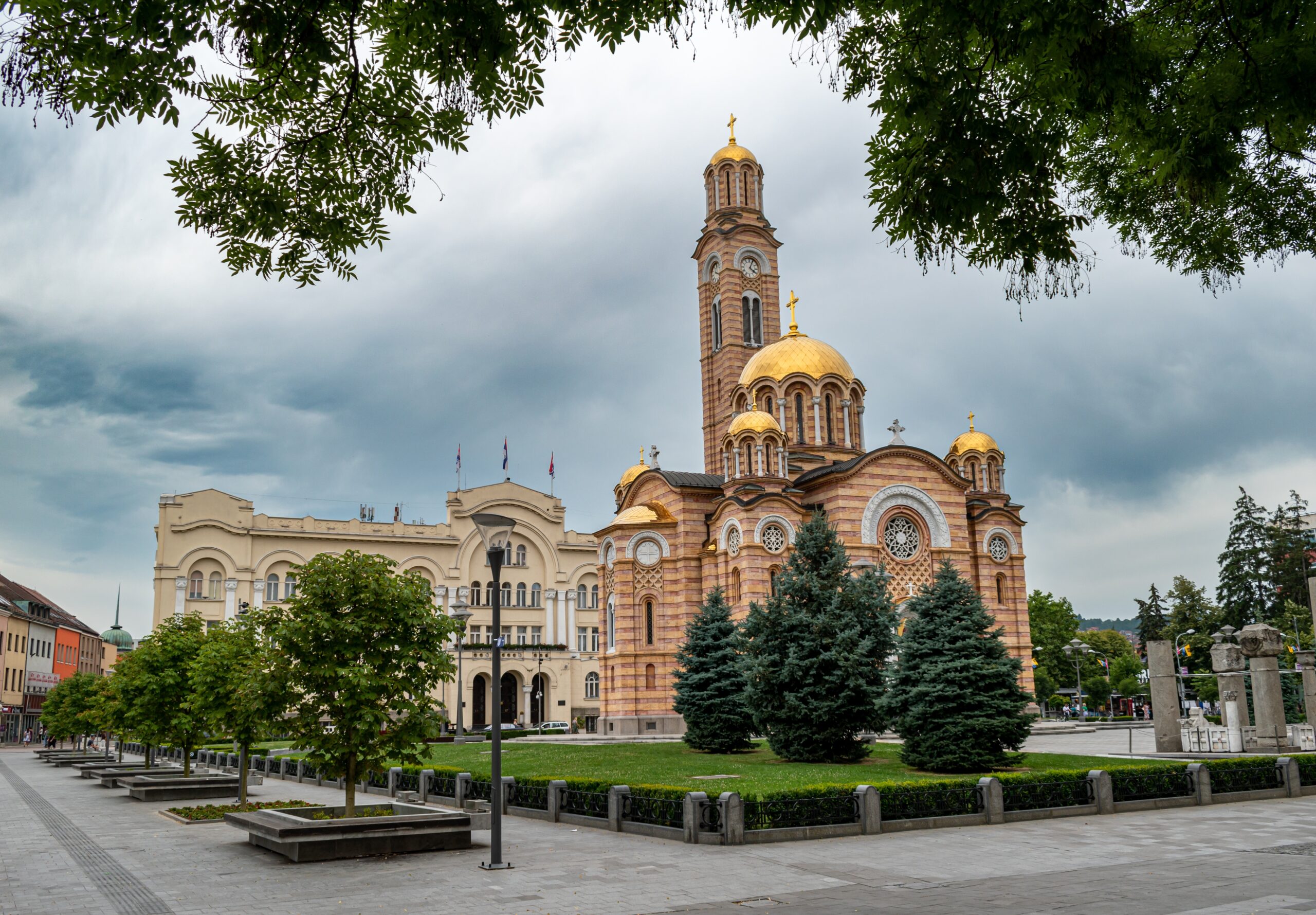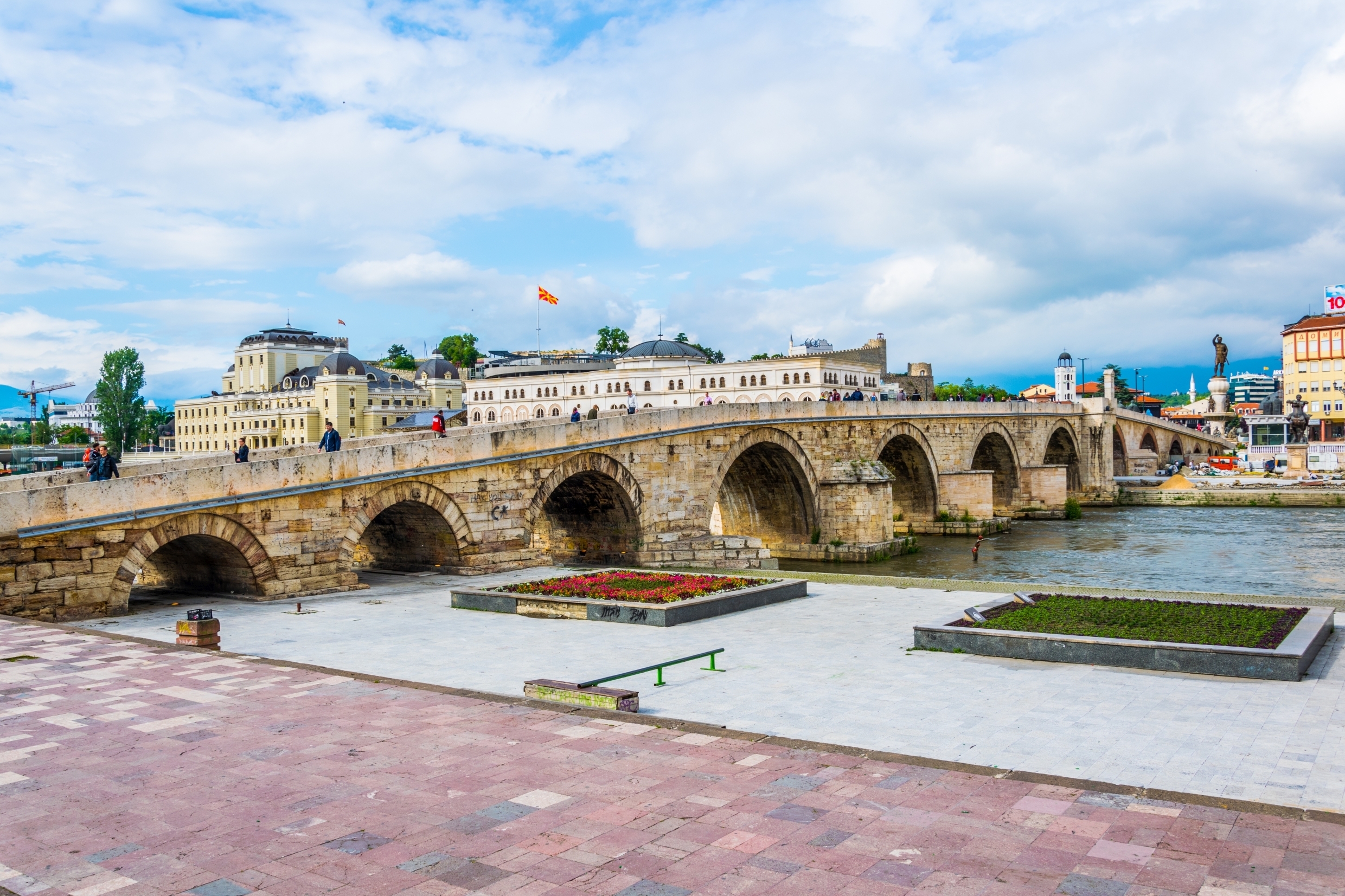Strategic Analysis Balkan Brief
Second half of June 2024
Petra Bošková, Dominik Boris, Natália Lešňovská, Simona Škríbová, Lýdia Chobotová

Photo: Shutterstock.com
Albania
OLAF claims Albania misused €33 million from the EU
On June 21, the EU Anti-Fraud Office, OLAF, found out that Albania misused €33 million from EU funds aimed at the development of Albanian rural agriculture. Now, OLAF urges the European Commission to suspend further €112 million for rural agriculture development in Albania.
The fraud was discovered by OLAF by chance when one grant applicant, believing he was wrongly rejected, referred to both the Albanian prosecution and OLAF. OLAF then discovered how the Pre-Accession Assistance for Rural Development grant procedure was manipulated. First, potential applicants were advised to use the services of a local consultancy company, which requested a sizeable part of their grant to facilitate the contract. Then, the competitive process was rigged by the submission of fake offers, contracts were sometimes awarded without competition, and the prices for investments were inflated. At the same time, some of the beneficiaries breached their contractual obligations. OLAF calculated that around €33 million were embezzled this way. The misused money and the whole scheme were allegedly run by the Albanian National Agency for Rural Development.
OLAF advised the Commission to block €112 million in the instrument for Pre-Accession Assistance for Rural Development until “remedial measures were put in place to protect the EU financial interests from any illegal activity”. Moreover, OLAF recommended the Commission to declare the grant calls in question as invalid.
Sources:
- Albanian Daily News, “OLAF: Serious Misuse of EU Pre-accession Agricultural Funds in Albania”, https://albaniandailynews.com/news/olaf-serious-misuse-of-eu-pre-accession-agricultural-funds-in-albania
- Gjergj Erebara, Balkan Insight, “Albania Misused 33 million Euros of EU Funds, Anti-Fraud Office Says”, https://balkaninsight.com/2024/06/21/albania-misused-33-million-euros-of-eu-funds-anti-fraud-office-says/
Bosnia and Herzegovina
Bosnia Confirms Sentences for Serb Ex-Soldiers in Bosniak Massacre
On June 18, the BiH state court upheld the convictions of ten former Bosnian Serb Army soldiers, sentencing them to a total of 162 years in prison for the mass execution of 24 Bosniak civilians in June 1992 in the Bosanski Novi area.
The appeals chamber’s ruling confirmed the initial November 2023 verdict, which found the soldiers guilty of forcing the villagers to dig their graves before killing them.
The six soldiers received 18-year sentences: Ranko Balaban, Ratko Goranja, Nikola Reljic, Mirko Odzic, and brothers Ranko and Dragan Baltic. Rajko Karlica, Milenko Brcin, and Milenko Babic were each sentenced to 15 years, while Miroslav Kapetanovic received a nine-year sentence.
The court’s initial findings detailed that, after the funeral of a Serb soldier on June 22, 1992, the defendants, part of an armed group of over 20 soldiers, went to the villages of Alici and Ekici. There, they threatened Bosniak civilians, forcing them out of their homes, and took them to the Serbian Orthodox cemetery. The soldiers physically assaulted the men in front of their families before separating around 90 men and taking them to the Muslim cemetery. There, the men were forced to dig a grave before being executed by a firing squad.
The second-instance verdict addressed the defence’s challenge to the testimonies of three key witnesses with plea agreements with the prosecution. The appeals chamber ruled that these testimonies were consistent and decisive, providing a clear understanding of the defendants’ roles in the massacre. The court noted that the defence had selectively interpreted witness statements, whereas the trial chamber considered the testimonies entirely, confirming their reliability.
This ruling is final and cannot be appealed, solidifying the sentences of the ten former soldiers for their roles in the 1992 atrocity.
Sources:
- Emina Dizdarevic Tahmiscija, Balkan Insight, “Bosnia Upholds Serb Ex-Soldiers’ Sentences for Executing Bosniak Villagers”, https://balkaninsight.com/2024/06/18/bosnia-upholds-serb-ex-soldiers-sentences-for-executing-bosniak-villagers/

Photo: Shutterstock.com
Montenegro
Montenegro Urged to Strengthen Cyber Security Measures
A recent BIRN report calls for Montenegro to enhance its cyber security institutions and increase public awareness about data protection, digital rights, and online security. The report highlights that while Montenegro has made legislative strides in cybersecurity, its enforcement remains weak due to financial constraints, limited personnel, and insufficient training.
The gap between the law and its implementation leaves Montenegro, which has faced significant cyberattacks in recent years, vulnerable to threats. Since 2016, Montenegro has endured several sophisticated cyber attacks, including a major incident in August 2022 that disrupted government websites, email systems, and services at multiple institutions, such as courts and the Revenue and Customs Administration.
BIRN’s report, “Analysis of Current Cybersecurity Capacities and Digital Rights in Montenegro,” is based on over 300 responses from the public and private sectors, academia, international organisations, NGOs, and universities.
One critical finding is that only 6% of respondents believe Montenegrin citizens are aware of cyber threats and how to respond. Similarly, only 12-18% of respondents think institutions are capable of supporting digital crime victims, effectively combating cybercrime, and providing access to public data about digital crime mechanisms. These findings underscore the need for educational and informational campaigns to boost awareness about data protection and cybersecurity.
The analysis also reveals widespread ignorance about digital rights and cybersecurity among the general population. Approximately 55% of organisations reported no detected cyber incidents, which may indicate underreporting or a lack of detection capabilities rather than an actual absence of incidents. With only 6% of citizens aware of how to handle cyber threats, there is an urgent need for extensive education initiatives.
The report notes that the government has proposed a Law on Information Security, which mandates the creation of a Cyber Security Agency. This agency would be responsible for early detection and defence against cyber threats, coordinating crisis responses, and ensuring the application of international security standards. However, the proposed law lacks a clear delineation of responsibilities among various authorities.
Overall, the BIRN report emphasises the necessity for Montenegro to improve its cybersecurity infrastructure and public education to mitigate digital risks effectively.
Sources:
- Borislav Visnjic, Balkan Insight, “Montenegro Needs to Bolster Cyber Security Institutions: BIRN Report”, https://balkaninsight.com/2024/06/24/montenegro-needs-to-bolster-cyber-security-institutions-birn-report/
- BIRN Report, “Current Cyber Security Capacities and Digital Rights in Montenegro” https://balkaninsight.com/wp-content/uploads/2024/06/Cyber-security-capacities-and-digital-rights-in-Montenegro-1.pdf
Kosovo
Kosovo Serb Sentenced for 2023 Attack on NATO Peacekeepers
On June 24, 2024, a Kosovo court sentenced a Kosovo Serb, Nenad Orlovic, to 15 months in prison for his involvement in a violent group attack on NATO peacekeepers in May last year.
The specific attack took place on May 29, 2023, in the Serb-majority municipality of Zvecan amid heightened tensions between ethnic Serbs and Kosovo authorities. The unrests were triggered by the installation of ethnic Albanian mayors in predominantly Serb areas following local elections boycotted by the Serb community. Overall, protesters clashed with Kosovo Force (KFOR) peacekeepers in multiple municipalities in northern Kosovo, resulting in injuries to both sides and drawing international concern.
The May clashes left about 50 protesters and more than 90 NATO peacekeepers from KFOR injured. The Pristina Basic Court ruled that Orlovic, also known as „Nemac“ (German in the Serbian language) or „Rus“ (Russian in the Serbian language), attacked and threatened KFOR forces with “improvised explosive devices as well as firearms” while collaborating with other Kosovo Serbs.
For his part in the attack, Orlovic was arrested in June of last year and has been detained ever since. In addition to his 15-month prison sentence, he must also pay a fine of 12 thousand EUR.
The conviction fits into the broader picture of Kosovo’s officials denouncing the attacks and attempting to fight destabilising forces. Kosovo’s Interior Minister, Jelal Sveçla, previously emphasised that all individuals involved in attacks against KFOR will face justice and suggested additional prosecutions. NATO also called for accountability for the attacks in May this year, on the anniversary of the attacks. “One year ago, peacekeepers of the NATO-led KFOR mission were attacked in the course of violent protests in the municipality of Zvecan. 93 personnel were wounded, some of whom with life-changing injuries. These attacks were unprovoked and were totally unacceptable,” KFOR stated in a press release. In total, Kosovo Police have arrested at least five people for their involvement in the violence.
It is important to mention that it is not only NATO peacekeepers who have been targeted during the attacks. The Association of Journalists of Kosovo (AJK) has logged 20 attacks on media crews and respective journalists during the May attacks, which were not exclusive to the aforementioned Zvecan municipality.
Sources:
- Bami, Xhorxhina. “Kosovo Journalists Left Unprotected in Violent Protests in North.” Balkan Insight. https://balkaninsight.com/2023/06/02/kosovo-journalists-left-unprotected-in-violent-protests-in-north/.
- Bami, Xhorxhina. “Kosovo Serb Jailed for 2023 Mob Attack on NATO Peacekeepers.” Balkan Insight. https://balkaninsight.com/2024/06/24/kosovo-serb-jailed-for-2023-mob-attack-on-nato-peacekeepers/.
- Isufi, Perparim. “Protesters, Peacekeepers, Injured as Violence Erupts in North Kosovo.” Balkan Insight. https://balkaninsight.com/2023/05/29/protesters-peacekeepers-injured-as-violence-erupts-in-north-kosovo/.
- “Sveçla: Everyone who was part of the attacks on KFOR will be brought to justice.” Kosova Press. https://kosovapress.com/en/svecla-secili-qe-ka-qene-pjese-e-sulmeve-ndaj-kfor-it-do-te-sillet-para-drejtesise.
- Zeqiri, Ardita. “NATO Demands Accountability for Attacks on Peacekeepers in North Kosovo.” Balkan Insight. https://balkaninsight.com/2024/05/29/nato-demands-accountability-for-attacks-on-peacekeepers-in-north-kosovo/.

Photo: Shutterstock.com
Serbia
Serbia and Kosovo Failed to Meet Under EU Dialogue
Meetings between high political representatives of Serbia and Kosovo under the EU dialogue were due to have their next round in Brussels on June 26, 2024. Despite confirmation of the meeting from both sides, President of Serbia Aleksandar Vucic and Prime Minister of Kosovo Albin Kurti ended up meeting only with representatives of the European Union.
A planned trilateral meeting between Serbian President Vucic, Kosovian Prime Minister Kurdi, EU foreign policy chief Josep Borrell and EU representative for Belgrade-Pristina dialogue Miroslav Lajcak did not take place, with Borrell stating that “no progress in implementation of the agreement could be achieved”. In a press release, EU foreign policy chief Borrell said that the meeting did not occur because Serbia failed to meet the conditions presented by Kosovo’s Prime Minister Kurti. The Kosovo side set three conditions: “Formalisation of basic agreements by signing by respective heads; withdrawal of reservation letter by former PM of Serbia, from December 13 2023; and handing over Milan Radoicic and his paramilitary group to Kosovo authorities.” Borrell further stated that “Serbia was not ready to meet Kosovo’s conditions, citing constitutional constraints”.
Kosovo PM Kurti said that the conditions presuppose guarantees of good faith and goodwill that would enable the implementation of the agreement”. Serbian President Vucic told the media that the meeting with Kurti did not take place because Kurti did not want or was not allowed to meet him. “He is not ready to meet with me; that was the official answer. These are important things and important signals. Moreover, I am sure the EU will say today who did not want a meeting. I believe they will have to say that there was no will of one side with the other side”, President Vucic said. Referring to the conditions presented by the Kosovo side, he said that these lead to a de jure recognition of Kosovo, which Serbia firmly rejects. President Vucic also indicated that the dialogue between the emergency negotiators Petar Petrovic (Serbia) and Besnik Bislimi (Kosovo) will continue. Their meeting is expected to take place on July 2 or 3, 2024.
The European Union will soon see changes in the form of a new European Commission. However, EU foreign policy chief Borrell said: “In a few months, there will be different people, different names in our jobs, but the agreements, the council conclusions and the European Union’s expectations will not change. The member states will not change. The commitments and obligations of Kosovo and Serbia will not go away. Everyone will still be looking at the capacity and willingness of the Serbian president and Kosovo prime minister to deliver a better European future for their people”.
Sources:
- Xhorxhina Bami and Milica Stojanovic, Balkan Insight, ´ Serbia’s Vucic, Kosovo’s Kurti Fail to Meet After ‘Preconditions’ Disagreement´, https://balkaninsight.com/2024/06/26/serbias-vucic-kosovos-kurti-fail-to-meet-after-preconditions-disagreement/
- Radio Free Europe, ´ Meeting Between Kosovo, Serbia Leaders Falls Through As EU Vows Normalization´, https://www.rferl.org/a/serbia-kosovo-talks-eu-normalization-borrell-kurti-vucic/33011457.html
- N1, ´ Vučić: Nije bilo sastanka s Kurtijem, nije hteo da me vidi´, https://n1info.rs/vesti/vucic-nije-bilo-sastanka-s-kurtijem-nije-hteo-da-me-vidi/
- Danas, ´ Vučić iz Brisela: Sastanka sa Kurtijem nije bilo, kaže da nije spreman da me vidi´, https://www.danas.rs/vesti/politika/vucic-iz-brisela-sastanka-sa-kurtijem-nije-bilo-kaze-da-nije-spreman-da-me-vidi/
North Macedonia
Current Challenges in Bulgarian-Macedonian-Greek Relations
On June 26, Bulgarian President Rumen Radev voiced strong criticism of North Macedonia´s policies, asserting that they are in direct opposition to European values and principles. He contended that the current new administration in Skopje is unwilling to acknowledge the existence of the Bulgarian minority, a stance that conflicts with the consensus decisions of the EU Member States. He called on both the Bulgarian government and European institutions to take concrete actions to uphold democratic principles and human rights, which are fundamental to the EU enlargement process. Radev warned that if the EU does not protect the European perspective of the Balkans, the region might eventually destabilise Europe itself.
Boyko Borissov, the leader of the GERB party and who is expected to become Bulgaria’s Prime Minister again, stressed the importance of adhering to international agreements, particularly those included in the EU negotiating framework. He underscored the necessity for North Macedonia to act responsibly and warned that without adhering to their agreements, they would not secure the needed support. Borissov also mentioned his readiness to initiate a dialogue with Hristijan Mickoski, the Macedonian Prime Minister, if he becomes Bulgaria’s Prime Minister again.
Macedonian Prime Minister Hristijan Mickoski expressed his willingness to engage in dialogue with Bulgarian leaders, President Radev and GERB leader Borissov. Mickoski emphasised that good neighbourly relations must be built on mutual respect, not on the degradation of one side to exalt the other. He criticised the current Bulgarian rhetoric as outdated and stressed the need for dignified and respectful negotiations based on arguments and facts. Mickoski reiterated North Macedonia´s historical recognition of minorities, including the Bulgarian minority, while pointing out the assimilation issues faced by the Macedonian minority in Bulgaria, as highlighted by multiple judgments from the European Court of Human Rights.
Greek Prime Minister Kyriakos Mitsotakis issued a stern warning to North Macedonia, accusing it of violating international law and agreements. He criticised Skopje for its problematic behaviour and reiterated the importance of adhering to the Prespa Agreement, which defines the official name of North Macedonia. Greek Foreign Minister Gerapetritis underscored the necessity for North Macedonia to respect its constitutional name in all official capacities. Mitsotakis emphasised that compliance with international treaties is crucial for North Macedonia´s aspirations to join the European Union.
The interactions between Bulgaria, North Macedonia, and Greece highlight the complex and often contentious path toward European integration for Balkan nations. While there is a shared desire for progress and development within the European framework, the need for mutual respect, adherence to international agreements, and recognition of historical and cultural identities remains critical.
Sources:
- Momchil Rusev, “Biggest Fear of North Macedonia´s Political Class Is to Recognize Existence of Word “Bulgarian”, Says President Radev; Bulgarian News Agency, https://www.bta.bg/en/news/697434?download=1
- Nevenka Nikolik, “Borissov: Agreements, especially international ones, must be observed”, Macedoanian Information Agency (https://mia.mk/en/story/borissov-agreemnets-especially-international-ones-must-be-observed
- Angel Dimoski, “Mickoski: Gov´t ready for dialogue, no good neighborliness if one side is degraded while the other is exalted”, Macedoanian Information Agency https://mia.mk/en/story/mickoski-govt-ready-for-dialogue-no-good-neighborliness-if-one-side-is-degraded-while-the-other-is-exalted%C2%A0
- Bisera Altiparmakova-Marusic, “A warning to our neighbor – you´re not off to a good start”, Macedoanian Information Agency https://mia.mk/en/story/mitsotakis-a-warning-to-our-neighbor-youre-not-off-to-a-good-start

Contact us